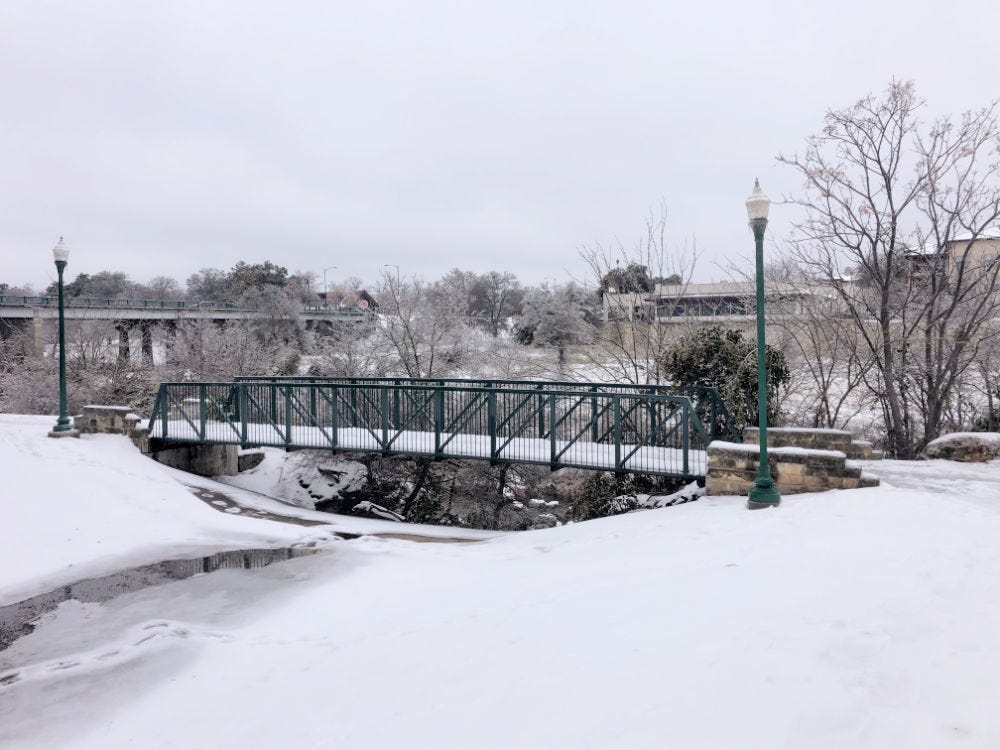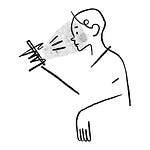Seth is in Arkansas and Tsh is in Texas, which means this week they've been covered under a blanket of snow and ice. It took a while until they could even record at all, but once they did, they did a quick check-in before the power went out again, followed by a more leisurely chat about what it means to survive vs. thrive. What do moments like this — and even moments like the global pandemic — teach us about what it is we truly need to live another day?
Seth: Website | Newsletter | Twitter | Instagram
Tsh: Website | Newsletter | Twitter | Instagram
Shirt of Flame: A Year with St. Therese of Lisieux, by Heather King
It Is Right and Just, by Scott Hahn & Brandon McGinley
Scroll down for the transcript.
Seth: Welcome to A Drink with a Friend, I’m Seth Haines. Tsh: And I’m Tsh Oxenreider.
[on a walk with snow crunching sounds]
Okay, Finn. What do you think of this weather?
Finn: Hectic.
Tsh: What do you mean hectic?
Finn: Cold.
Tsh: Yeah.
Finn: The snow is iced over.
Tsh: Right. Have you ever seen something like this in Austin?
Finn: Uh, no.
Tsh: You’ve seen it in Oregon, right? But this isn’t Oregon.
Finn: Yeah.
Tsh: This is Texas. It’s bonkers. I was born and raised here and I’ve never seen this. What have you been doing the past few days?
Finn: Well down at the park there’s a snowbank and me and Tate have dug burrows. Tsh: Really?
Finn: Yeah.
Tsh: Were you freezing doing that? Or were you okay because you were moving? Finn: I was freezing and Tate’s I could fit my entire body inside of it.
Tsh: Really?
Finn: Yeah.
Tsh: Like father like son. Your dad used to camp in the snow. You know those stories? When he builds igloos and camps in them? What do you hope happens by the end of this week?
Finn: It thaws. I want to go back to having a stick-ish land but I cannot even, I could barely even see the sticks that are on the ground.
Tsh: What do you mean by stick-ish land? What have you been doing with sticks? Finn: Making stuff.
Tsh: Like whittling and carving and using dad’s tools to create all sorts of inventions, right?
Finn: And my own.
Tsh: Your own tools, yes. In the meantime, you know this is hardly ever going to happen again here in Texas so are you just going to make the most of it? Well, you have been making the most of it. You’ve been playing a lot.
Finn: Yes. We don’t know if this won’t happen again.
Tsh: Well, we don’t, of course. No one knows the future. But this is pretty unusual, right?
Finn: Yeah.
Tsh: Yeah.
[on a walk with snow crunching sounds]
Seth: Today we are talking about what everybody’s talking about this week. This is going to date the podcast a little bit but that’s okay. We’re talking about the snowpacalypse that has swept the country.
Tsh: It’s weird because you’re in Arkansas, I’m in Texas and it’s literally colder here than it is where we lived in Central Oregon up in the mountains a few years ago. It’s insane.
Seth: What’s your temperature down there right now?
Tsh: That’s a good question. Let’s find out. It was 5 when I woke up this morning which, we are up to a balmy 27. That’s actually pretty warm. How about you guys?
Seth: A balmy 27 degrees. Yesterday, when we woke up it was -15, with no wind chill, that’s without the wind chill. Some places in Fayetteville recorded -18 which was the state record. Congratulations to us, we set a record! That was incredible. Right now, it is 19 degrees and the wind chill has it feeling like 12 degrees. Today, I went out in my swimsuit and walked around. Thirty whole degrees warmer. It was quite pleasant outside.
Tsh: Our feels like weather, our windchill is 18. I think the main thing I think of, because Kyle’s mom is calling several times a day giving us suggestions on what to do and through absolutely no fault of her own, you forget the infrastructure issues because it’s not about not knowing what to do it’s about whether the lay of your land and the environment in which you live actually allows for that. Everything she’s suggested, we actually can’t do that because of x, y, and z reasons in terms of wood-burning stoves or driving somewhere. She keeps forgetting we can’t drive anywhere so she’ll make a quick suggestion, lovely thought but we can’t do that.
Seth: You can’t drive because you guys don’t have the snow plows and the salt trucks and that stuff.
Tsh: Exactly. I say all this to the northerners who are balking at southerners in general, Texans in particular because of our ridiculous, crazy infrastructure that’s collapsed, basically, that this is why. I remember having the same feelings whenever our family up north would complain in the summer about 85/90 degrees as a high and we would roll our eyes thinking, oh my gosh, try 100+ for a month straight. But their infrastructure can’t handle it. You don’t have central A/C and you don’t have the swimming pools everywhere. It’s the same beast, really. It all has to do with your typical climate. Today, we’re going to talk about a quick thought on what we’re learning about survivalism and what it actually means really to live a good life and to thrive because I think a lot of people are feeling this way, too. Before we get into it, Seth, what are you drinking?
Seth: I am drinking a lovely green tea from our favorite local tea shop here, Savoy. It’s fantastic. I don’t really drink a lot of green tea, I’ve been told I should because it’s really good for the body. Lots of antioxidants, so they say. So today I’m antioxidizing—I don’t know if that’s a verb but that’s what I’m doing. I’m antioxidizing. What are you doing? What are you drinking?
Tsh: I’m honestly doing my straight-up black coffee that I always do. It’s the venom blend from 309 across our street. I’m doing it a little bit hesitantly because I read this morning, we’re recording this on Ash Wednesday, so fasting, that it’s not good to drink coffee while you fast. That apparently it’s better to drink tea for I guess antioxidant reasons or whatever. I thought, oh gosh, I just read that, does that mean I shouldn’t drink coffee today? But then I thought, I want to be smart and sane and I’ll cut back my coffee but I’m not going to not drink coffee today. I’ll switch to tea later when I would normally get a second cup of coffee.
Seth: I think smart and sane is good. Also, I’ve been told, I think you said earlier, you’re fasting from electricity for Ash Wednesday, right?
Tsh: I know, that’s what we were literally joking about as a family. Maybe God is choosing our fast for us? Yeah. We woke up, we had it for a few minutes. I literally was about to open my laptop and start writing and then it went out. We went three hours without. We’re very grateful we have had power up until just now. We almost have the survival skill issue going on because so many friends don’t have it that we feel a bit like, gosh, we did nothing to deserve this, thank you powers that be and God and it could go off again at any moment. I would still be okay.
Seth: Powers that be, that’s air quotes, right? The “powers that be”, that’s a great pun. Good job.
Tsh: I didn’t even mean that.
Seth: Let’s talk a little bit about what the issue is in Texas because I think this might intrigue some of the listeners. My parents are south in the River Valley in Arkansas so they are to some degree connected to some of the infrastructure that’s connected to Oklahoma and Texas. They’ve had rolling blackouts. We have had none. We’re just an hour north. I’d love to hear a little bit about when you talk about the things you can’t do because you live in Texas and the rolling blackouts. What is the issue with your infrastructure? Why can’t you guys, the richest state according to you guys, get it together and have functioning power grid? What’s going on down there?
Tsh: I know, if only listeners could hear the eye rolls I’m giving because even when I was a kid and I grew up here this mentality that so many Texans have that we’re the best and we’re the greatest as though there’s a reason we need to rank ourselves among others. I don’t know where this comes from. That could be a whole other episode about the psychology of the people that live here. For whatever reason, and honestly, I am not an expert here. I am just now learning that this is even a thing. Apparently, we have a thing called ERCOT, which is the Electric Reliability Council of Texas, and essentially what that is we provide our own power. I guess something within the layers of those who are in charge plus the science has meant we don’t have enough power for everybody who needs it. The state has been going through rolling blackouts, massive rolling blackouts, for days and days now. I don’t know how they decide who’s doing it. The other problem is that, at least in the central Texas area like Austin, a lot of people were told they’d be on rolling blackouts but then it just shut off. Last I heard, my
parents were going to sleep, their whole neighborhood has just been hanging out in their vehicles in their driveways for heat.
Seth: At least they’ll feel safe?
Tsh: I know, and of course, we’ve told my parents, can we come get you? But here’s the problem, and this is the whole infrastructure thing that I was talking about, we have no way to get them and they have no way to get to us because the roads are all completely iced over. In fact, I don’t know about you guys, but we got another layer of ice this morning or last night. Now on top of all the snow that we’re not used to having, is ice that makes everything as slick as snot and we can’t walk around outside if we wanted to because of that. We don’t have the things that you have up north to take care of that.
Seth: This is more complicating for Texas because and we experience this a lot, you guys get very little ice and snow, it’s super rare, right?
Tsh: Yeah. I can count on one hand, I grew up here, I can count on one hand the amount of times. I know that we have set a record for this particular ice storm that we have not gotten this much snow since 1949 which means most people out and about have never lived through this.
Seth: In Arkansas where we live, we get a lot of ice. We get a pretty good snowstorm once a year, although the last four or five years we’ve been pretty free. But you’re right, ice—no amount of plowing and very little amount of salting, really helps ice. You just have to let it thaw or get worn down. You guys are in a tough spot if you had ice last night, which means you are literally in survival mode.
Tsh: It’s such a funny, weird...I say funny, it’s not funny. It’s such a weird situation that we’re not normally in. I’ve got a text thread among some of my girlfriends in town and we’re all just checking in on each other when we can. Of course, some drop off because you realize they don’t have power so their phones are dead. Others are conserving power. I have a girlfriend that lives near my parents. They were in bed by 9:00 pm because they had nothing else to do. They had no lights, no heat, might as well just go to bed. I guess it’s interesting to me how quickly this sort of thing strips away our modern sensibilities into what do we truly need to survive and what does it mean to be human and what does it mean to exist? It’s weird.
Seth: We thought that that happened with the pandemic last March, stripping oil out of the social events and social functions, replacing them with some degree to things like Zoom meetings which how many of those have we done in the last year? But about the time we got acclimated to stripping away social functions now its stripping away of all the things. All the social functions but also all the social media functions, if you’re living in Texas or these places with rolling blackouts. It’s not like you can jump on Twitter and tweet away for two hours. Even like, we were talking this morning, or texting this morning, you and Amber and I were texting about our alliance on electronic books and how you rediscovered or found this morning a “book without a battery” and I thought that was a hilarious comment.
Tsh: I know. Here’s the thing, I long prefer paper books and I have a whole stack of them all the time. It’s just funny to me how as soon as we don’t have access to the internet or electricity, our brains can go into this panic mode of what do I do? As though, like Amber said, I though it was great, it’s newfangled. Electricity is relatively newfangled in the past 100 years. I totally was tongue-in-cheek about the battery-less books because I side aisle the lack of paper books in the world but it’s really true. It’s an interesting phenomenon when we’re in these situations. I don’t know if you remember The Truman Show, that end whenever they are, I’ve just been thinking about this a lot. Whenever the Jim Carrey character finally leaves the dome he’s been living in a bubble in and everyone’s cheering, watching TV and then as soon as it’s over, the two security guards look at each other and say, well, now what do you want to do? It has that feeling to me like what do we do now? The thing that we’ve been distracting ourselves with is over. You brought up the pandemic. I was in a mini staff check-in meeting yesterday via Google Meet for our school. It was one of those, whoever has power just pop on, let’s just see how each other’s doing. Somebody made this comment before, the weird thing is that I kind of forgotten for the past 24 hours that we’re in a pandemic. I’ve been home, I haven’t had to wear a mask and I’m just thinking about literally keeping the heat on and making sure my kids have food and then I’ll remember, oh yeah, and we’re in a pandemic. Even if the power was on or there was no snow, we couldn’t go see people anyway so you do kind of forget the layers of survival here.
Seth: Amber was saying this afternoon or early this morning, she was saying how maybe this is God’s way of shutting us up so that we can actually take a break from the pandemic and maybe some people can not get so sick. I think that’s a good point. Sometimes we don’t want to check our own hubris, see previous comments about Texas power grid, we want to do things on our own and we end up ultimately creating problems and to some degree catastrophic problems, like I want to go to the restaurant. I want to go to the football game. I want to do this. I want to do that. As a result, people get more sick. Right now, at least in the south, God’s saying nope. You stay home.
Tsh: Yeah. Maybe there is. You had mentioned right before we hit record, we were just asking each other about our routines and you guys are all home. What are you learning during this crazy ice storm, or snowstorm, about survivalism for yourself. Maybe not so much like a food, water, shelter way but a little bit more like the internal virtues and the way of thinking that you need for just mere survival. Have you been learning about yourself any?
Seth: The theme of this podcast, the theme that we talk about all the time is sacramentality and finding God in all things. I think one of the questions that we have to ask ourself when we’re in a survivalist mode, how do we find God there? And can we above that survivalism and get to something more like thriving? More like thrivalism as we jokingly said prior to pressing record. I’ve been asking that question a lot the last two to three days, particularly yesterday as it was -15 and nobody could go outside without their eyeballs freezing. What does it look like? What does it look like to really thrive in the space particularly now that we’re now in the season of Lent and we’re already stripping away so many things so what does it mean to really thrive? Yesterday I had one of those business freak out moments. Do you ever have those, where you’re like, oh gosh, am I producing enough? Am I creating enough? Is there enough income? Do I have enough stored back? Do you do this or is this just my neuroses?
Tsh: Story of the life the past twelve years.
Seth: So you’re running these hoops and you’re running these thoughts and then this morning one of the things that I decided I wanted to do for Lent was really learn to pray The Divine Hours. I’ve never done that. I don’t know how to do that. It’s very difficult to do and you’re pointing to yourself now which means are you doing this also?
Tsh: This is literally what I was thinking about doing this morning.
Seth: Well, there you go. I am doing it. It is difficult-ish and mostly it’s difficult just because it’s long and it’s a lot of Psalms, you’re praying through a lot of Psalms. That’s a thing. As I was praying it through, I kept seeing over and over again this recurring theme of provision, like you are My Rock, you are My Provider, you are this, you are that. I think that there’s a real peace there of just saying, okay, this idea that maybe there’s not enough, maybe I haven’t done enough, produced enough—this is a thing that goes back for all of humanity. The Psalmist resolved it this way and gave me a little bit of encouragement that I’m not going to freeze to death, I’m not going to starve to death, I do live in realize privilege, and that there is provision from somewhere else. I think today, that’s been the thing that’s really helping me thrive. Part of thriving is pushing away the neuroses of getting out of your own head and getting out of the work of doing what you’re supposed to do, focusing on what you need to do. Today that thought that I don’t really have to provide for myself, I just have to be consistent and focused and do the next right thing. That’s been really helpful for me to thrive. That may look like at 4:00 kicking off and spending some time with my family or picking up a book without a battery or doing something that’s maybe not quite so pre-pandemic, pre-snowpacalypse entertain-ey, so to speak. I think that’s how I’m finding thriving.
Tsh: That’s good.
Seth: What about you?
Tsh: Kind of the same. I’ve been thinking about this idea of the concept of religion being giving God what is due to God and that we can’t possibly ever actually do that because he is due infinite praise and worship and we’ve been given an infinitely more about from God than we could give back. If that’s the definition of religion so our acts of religion, the things we do all throughout the day and the way we interact with the sacramental things in our lives, if they are small little, I don’t want to say penances but that’s on my mind because of Lent, things we do to remember our humanity and that the way we give God the justice due makes us more human. I’ve been thinking a lot about that connection with faith and works. This is a word salad because I’m still thinking through it. It’s just on my mind a lot. One thing that I’ve been really reminded of the past few days is how much I love Kyle because of his heart and because of how he serves. It is the first thing that comes to his mind, is how can I help other people? He has been spending, he hasn’t been working the past few days because he drives around for his work all over central Texas and he can’t do that so he’s home. He’s been spending most of his time helping others. He’s been over at our neighbors doing all he can until his pipes thaw. He’s been checking the single mom that lives on the other side. Yesterday whenever things were finally okay he got his neighbors, he did some kind of work around system to help his neighbor have hot water. I don’t even get it but Kyle figured it out. After figuring out ours and being under the house, it was almost like he had this feeling of what do I do now? I feel a little lost. For me, combine that with we’ve made some newish friends in our neighborhood the past few months and we’ve just been texting back and forth how you doing? Do you need anything? Do you guys have a shop-vac? We baked some cookies, do you need anything? For me, I tend to think of community in the category of thrivalism, meaning it’s nice as an extra. It’s good just to have. We’ve been learning about that a lot this past year with the pandemic but I think it’s more survival than I realize, that I like to give myself credit for. I tend to be a very autonomous person, I can do it myself. Man, it feels good to have someone just text you and say, how are you doing? That’s so simple. That’s such a basic thing. Our neighbor came over for soup a few nights ago because he doesn’t have heat or water and it was like, we need to be doing this all the time. It is lovely. We sat around and talked about Dominican monks and philosophy and it was like, you’re my neighbor, this is really cool. Over a bowl of soup and then he went back home. Community is part of our human need to survive.
Seth: I think when you move out into community, whether that’s through service like you’re talking about, I understand. It was a word soup to me about faith and works when you’re actually talking about working out your faith through service and how Kyle does that really well. It is very true. I’ve always thought that about him. When you talk about service, it pulls you out of your own head and your own self and it moves you out into the realm of the other. It creates connection. It allows you to see the God in other people, to be encouraged by the God in other people, to share the God that you have with other people. That connection, that way we were created, it really does set the conditions for thriving. For me, it seems like survivalism is that inward bend, I’m going to take care of me and mine. It’s like I’ve got six weeks of food stored and I’ve got a basement full of guns and weaponry and I’m going to “Katy, bar the doors! No one gets in my house.” That’s one way of living and certainly, by the tone of my southern accent, you can tell how I feel about that way of living. Certainly, you can survive that way but human thriving really does depend on moving out of the house and moving out into the world and connecting with other people and helping other people. And allowing yourself to be helped by other people, too. Right? That’s a huge part of what it means to thrive in a world full of human.
Tsh: That’s right. When I was dealing with depression, that was the advice given to me. Even though you don’t feel like it, check on someone else and see how they’re doing and that was the last thing I wanted to do because I was just wallowing in my own situation but it genuinely did help. I think this is a good reminder for all of us because even if you’re not in the middle of a snowpocalypse, you are still on this planet which is going through a pandemic. It’s just a good reminder, check in on people. Not only is it good for them, it’s good for you and allow yourself to be checked in on. It’s a good word.
Seth: These are the things that leave us thriving.
Tsh: That’s right. Honestly, by this time next week, it’s going to be thawed and I’m going to be grateful for the things, I say that, I hope I’m grateful. Humans are finicky like that. We forget easily. I’ve just been thinking about a lot of these thrival things that I have in my life that I’m grateful for. My silly dog. My garden that’s covered under snow. Shelves full of books. There’s a whole lot to still be thankful for.
Seth: That’s right.
Tsh: Speaking of books, what are you reading, watching, or listening to these days?
Seth: I was recommended a book that I just started. I’m only through the introduction so I can’t really talk about it that much whether I love it or hate it but it’s a book called Shirt of Flame: A Year with St Therese Lisieux by Heather King. I think this is super fascinating because in my first book, Coming Clean, I wrote about how a woman named Heather King led me into sobriety. Several years ago I was sharing that story and someone was like, oh my gosh, you know Heather King? I was like, yeah, she’s just a friend who lives up in Minnesota. Turns out, it’s a different Heather King so they were super impressed because they have read all the books that Heather King has written and there is zero connection. If you read Coming Clean and you think that this Heather King led me into sobriety, this is not the way it happened. Also, one of the facets that I remember being led into sobriety was the breakfast tacos I ate that morning which you brought me in Austin. It’s a whole other conversation that maybe we’ve had and maybe we’ll have again later. In any event, this book by Heather King is what I’m reading right now and I’m really excited. I’ll report back because right now, like I said I’m just barely into it. But I have it on good authority that this is my book.
Tsh: Very cool. I love it. I’m going to add that to my TBR list, like I don’t already have enough to read.
Seth: I was looking for a good Lent book so this is my nightly read. What are you reading, watching, or listening to?
Tsh: It’s definitely paper books these days because you never know. I’m reading a book, and I feel the same way, I’m past the intro but I’m only on page 35 so it’s basically the intro. It is Scott Hahn and Brandon McGinley’s latest book which is called, It is Right and Just. This is back to what I was hinting at a little bit with my word salad. The subtitle is Why the Future of Civilization Depends on True Religion. It’s this idea that human beings are religious by nature and yet it only works in a communitive, distributive...it’s one of these books I have to read really slowly because every sentence or paragraph is wow, I have to digest that and think about that for a while. Kyle and I, he got to hear all about it for half an hour this morning. It’s really good. They’re describing what religion actually is versus what we think it is and why religion is actually a matter of justice and how we can’t really escape it so it’s good to have good religion as opposed to fake or bad or wrong religion. I’ll let you know how it goes.
Seth: Have you gotten to the 30,000-foot argument for why true religion is all about justice?
Tsh: I’m literally on that chapter right now. I’m in the chapter called, Religion is a Matter of Justice. They start it off talking about there’s distributive justice and communitive justice which is a form of justice that only works in community because it’s about equanimity, basically. They’re making the point, this one part I think is really interesting, it says, “St Ambrose said especially bluntly that for the rich man giving of his excess to the poor is not charity that it’s actually the barest minimum demanded by justice and so
similarly to not give one’s extra coat to the poor man with no coat is according to St Basil an act of theft.” It gets into that. Then it says, “When the virtue of justice is replied not to our relationships with one another but to God, it becomes a virtue of religion and this is what we call transcendent justice.” It’s getting into the transcendent justice idea and what I was saying earlier about how it’s impossible, actually, to give God what he is due because God doesn’t lose anything when he gives us things or when he creates and sustains us. What does that mean for us as humans? Why do we even have religion to begin with? It’s basically the point is it’s good for us.
Seth: They wouldn’t put it this way, but again, they’re saying for real thrivalism, you have to go out into the world and work with others and work for others, work on behalf of others and this is the point true religion, of good religion.
Tsh: Yep, that’s right. It’s not just what’s in it for me and how does this make me feel? This is the part I haven’t gotten to yet where it says why the future of civilization depends on it. We’ll see. I’ll keep you posted.
Seth: That is a bold claim. If they deliver on said bold claim, I want to hear about it.
Tsh: I’ll probably bring it up. I’m not yet convinced but we will find out. I want to be convinced and I like Brandon McGinley. I like both of these guys and how they think.
Seth: We have made it all the way to the end of this podcast with no power outages.
Tsh: I was a little bit concerned that we would have to talk on double-time just to make sure we even get a sentence in. Thank you, Texas power grid for the past however many minutes this has been.
Seth: If you’d like to leave a donation for the Texas power grid, you can find a link in the show....no, that’s not true. You really can’t find a link in the show notes for that.
Tsh: [laughter] I know, but basically the best thing that you can do if you’re northern is to not make fun of us and if you’re southern and going through this as well, just know that you’ve got friends alongside you dealing with this.
Seth: Don’t settle for survivalism. Reach out to your neighbors, check in on them, bake cookies for them, make bread, soup, whatever the thing is. Don’t just survive but thrive.
Tsh: Yeah. Do what you can and honestly, accept that gift when you need it because literally as we’re talking, as you said that, my friend pinged me via iMessage we’re in survival mode for real now. Our friends are now flushing their toilets with pool water and boiling snow to wash pots and pans. If you have neighbors like this and you can get to them, bring them a loaf of bread or some cookies or do something.
Seth: Or invite them to your house if you have a big enough house. Do something. Tsh: Invite them to your house. Wear a mask. You can do it.
You can always support our individual work via our newsletters but if you’d like to support this show, you can do so at buymeacoffee.com/drinks. We’re actually in the process of creating a cool space for this show so stay tuned if you want to get more involved. If you want to support the show, that’s how you can pick up the next round of drinks for a few bucks which helps keep the lights on around here. You can find all my things at tshoxenreider.com. Seth, where can people find you?
Seth: They can find me mostly right now at sethhaines.substack.com, my Substack space. And on Twitter, which I’m not on for Lent @sethhaines and Instagram which I am on for Lent @sethhaines. I gave up sugar, man. I’m not giving up Instagram, too. That is too much. Sugar and Instagram and Twitter, you gotta give me one of those things. Also, sethhaines.com. I’m actually redoing my website over the next couple of weeks and soon at the end of the show I’ll just say like you, just go to sethhaines.com and that’ll be it.
Tsh: Good for you. Music for the show is by Kevin MacLeod, editing is by Kyle Oxenreider, and Caroline TeSelle is our transcriber and assistant extraordinaire. I’m Tsh, and Seth and I will be back here with you soon, maybe. Probably.
Seth: Cross our fingers.
Tsh: I think so. Thanks for listening.












